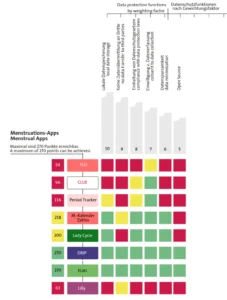Summary: The PRIVA SCORE rates the data protection of menstruation apps with a maximum of 270 points. Drip and Euki achieve the maximum score of 270 pointsbecause they store all data locally, do not pass on data to third parties, comply with data protection laws, obtain consent, are data-efficient and open source. FLO, CLUE and Lilly perform worst with 59, 96 and 63 points respectivelybecause they store data in clouds, often sell it to third parties and do not sufficiently comply with data protection laws. Menstruation Calendar and Cycle by Simple Design Ltd. and Lady Cycle reach the middle range because they perform well in some data protection aspects.
The PRIVA SCORE can receive a maximum of 270 points due to the calculation when evaluating menstruation apps.
As always, the PRIVA SCORE evaluates how well apps/services Data protection features fulfill.
When evaluating menstruation apps Drip and Euki perform best. They have the highest level of data protection (all 270 out of a possible 270 points) of the apps compared here. They store all data locally, transmit no data to third parties, keep the Data protection laws a, questions about consent to data collection, are data-saving and open-source.
And as always, there are apps in this area that are a nightmare when it comes to data protection.
FLO, CLUE and Lilly are at the bottom of the list with 59, 96 and 63 points. This is due, among other things, to the fact that the user data is stored in clouds, mostly data to Third party resold become and Data protection laws only partially or not at all complied with become. Open-source Of course they are not.
Menstrual calendar and cycle by Simple Design Ltd. and Lady Cycle still make it into the yellow area because they fulfill the data protection functions well on some levels – for example, when it comes to local storage, compliance with Data protection laws or the Data economy.

Explanation of data protection features
Local data storage: One of the safest ways to protect user privacy is to store data only on the device rather than in the cloud. Apps like Drip take this approach by not storing data on servers, which minimizes the risk of a data leak.
No data transfer to third parties: It is crucial that the app does not share data with third parties such as advertisers or data brokers. Many apps have been criticized for sharing sensitive data with third parties, which puts users' privacy at risk.
Compliance with data protection laws: This privacy feature refers to how well a provider complies with applicable data protection laws and regulations to ensure the privacy and protection of its users' personal data. For European users, this applies to GDPR compliance.
Consent to data collection: Users should be required to actively give their consent before data is collected that is not necessary for the basic function of the app. This ensures that users are informed about the data collection and consciously accept it.
Data economy: The app should only collect the data that is absolutely necessary for its functionality. Additional data requests should be avoided to reduce the risk of data misuse.
Open-Source: If the source code of an app is openly accessible, this means that compliance with data protection standards can be checked on the program itself.
